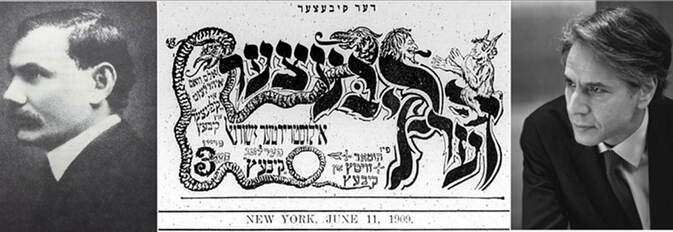 Antony Blinken is on the cusp of being appointed Secretary of State in the new administration of President Joe Biden. One thing many people may not know about Blinken is that his great-grandfather was a Yiddish writer of some repute. Meir Blinken was born in 1879 in Pereyaslav, Ukraine – coincidentally the same shtetl as Yiddish literature’s most famous name, Sholem Aleichem. Blinken gained a Jewish education at a Talmud Torah, before attending the secular Kiev commercial college, part of a joint educational project founded by Ukrainian and Jewish businessmen. He worked as an apprentice cabinet-maker and carpenter, before switching to become a massage therapist. Indeed, he is listed in the Lexicon of Modern Yiddish Literature with the trade of masseur. His son Moritz, Tony Blinken’s grandfather, who became an American lawyer and businessman, was born in Kiev. Blinken Senior emigrated to the US in 1904. His first story, written under the pen-name B Mayer, was published a year earlier, in 1903. Once in America, his sketches and stories appeared in a range of literary, progressive socialist and labour Zionist publications, including the satirical magazine Der Kibetzer (Collection) and Idishe Arbeter Velt (Jewish Workers’ World) in Chicago. In all, he published around 50 works of fiction and non-fiction. Blinken’s books include Weiber (Women), described in the lexicon as a prose poem, Der Sod (The Secret) and Kortnshpil (Card Game). A collection of his short stories published in 1984 and translated by Max Rosenfeld, is still available. His writing dealt with thorny topics including the effects of poverty, poor living conditions, religious strictures, inadequate education and the lack of understanding that immigrants feel about their new country. Most controversially, he was one of the few male Yiddish writers to address the subject of women’s sexuality, writing about marital infidelity and sexual desire and hinting at the sense of boredom felt by housewives. Another subject he tackled remains controversial to this day: showing empathy towards abortion. Writing in a review of Blinken’s work in the 1980s, the journalist and author Richard Elman pointed out that among Yiddish authors writing for the largely female audience of Yiddish fiction, Blinken “was one of the few who chose to show with empathy the woman’s point of view in the act of love or sin”. Elman and others believed that the greatest legacy of the author’s work was that it vividly evoked the atmosphere and characters of the very early Jewish diaspora in New York. According to a 1965 article by the journalist David Shub in the Jewish newspaper The Forward, Blinken was the first Yiddish writer in America to write about sex. In the same article, he wrote that Blinken was also an editor’s nightmare! By the time of his death in 1915 at the age of just 37, Blinken had opened an independent massage office on East Broadway, in the heart of what was at that time the city’s Yiddish arts and letters district. While his writing was very popular among Yiddish-speaking Americans of his own generation, Blinken’s star quickly waned after his death. Photo credit: Ukrainian Jewish Encounter
0 Comments
Leave a Reply. |
Keeping stories aliveThis blog aims to discuss historical events relating to the Jewish communities of Ukraine, and of Eastern Europe more widely. As a storyteller, I hope to keep alive stories of the past and remember those who told or experienced them. Like so many others, I am deeply troubled by the war in Ukraine and for the foreseeable future, most articles published here will focus on the war, with an emphasis on parallels with other tumultuous periods in Ukraine's tragic history. Archives
March 2024
Categories
All
|
 RSS Feed
RSS Feed
